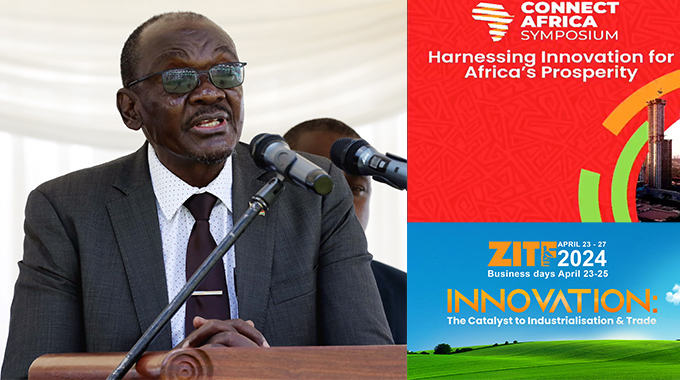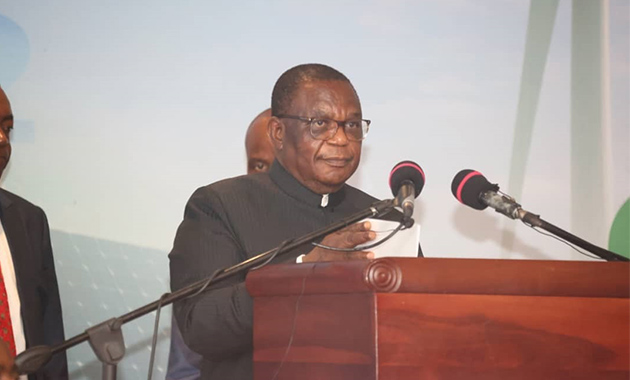Minister calls on media to be patriotic
Harare Bureau
GOVERNMENT has implored all mainstream media organisations in Zimbabwe to be patriotic and uphold national interests and ethos as espoused by the country’s new supreme law.
Information, Media and Broadcasting Services Minister Professor Jonathan Moyo, said this yesterday at his Munhumutapa offices while addressing senior editors and managers of all media organisations in the country in his first engagement with them after his appointment as minister.
“We make the assumption that the media elsewhere in countries that came into existence before us are inextricably intertwined — their existence, their conduct is tied to the history and the founding of the country in which they operate.
“That is before they tell a story, before they report about anything, there are certain fundamental issues relating to whose media we are talking about — which has to do with the country where they belong. And from our point of view we make this presumption that there is enough evidence to show that in the American mainstream media there is no shortage of the lunatic fringe media.
“The mainstream media in other countries cannot be separated from the fundamental values, ideals and ethos that make that country. And we make a presumption that every country has something fundamental about it in terms of founding values and ethos.
“So for the mainstream media, we make this presumption. Which is why we believe for example when America goes to war, its mainstream media follows the flag and it gets imbedded into the military. It becomes part of it, it never says this military should be reformed.
Prof Moyo said the US media remains patriotic during the military expeditions and will never say anything negative about their country.
“It (the media in America) never say this military must be reformed. It encounters all sorts of things this military will be doing there as they are fighting but when it comes back it tells the story, packages the story, whether its text, voice, email or audio, it packages it in a manner that does not shake the fundamental values and it decides when to say this and that. We make this presumption.
“When we look at the experiences of the countries that have been there before us and some which are very developed and influence our narratives, I would say the mainstream media in those countries is part of the ruling elite, you cannot separate them from the ruling elite.”
Prof Moyo said there was no conflict between the mainstream media in American and British establishments respectively, adding they “eat the same things when they go to rallies. They are the same”.
He said it was against this background that media and the Government were supposed to find each other, adding the people were supposed to forget the past experience.
“It is important to reflect on what we have in common about us, which is our starting point as a ministry, which is our starting point as Zimbabwe. What is it that brings us together as a country as opposed to what might generate different views.
“There has to be something that must be important to each and everyone of us — and is that which gives rise to Government, that which gives rise to collective enterprise.
“And I have a feeling especially now unlike before we had had an opportunity to engage as the very start. If before we had had an opportunity similar to this one, I am sure that at least we would have agreed on some common cause, common purpose and then have a shared understanding,” he said.
Earlier on, the media representatives were given the opportunity to present the issues that they wanted the ministry to immediately deal with that had for long been bedevilling the industry.
Media Alliance of Zimbabwe, that includes media representative bodies (Media Institute of Southern Africa and Zimbabwe Union of Journalists among others) through their country’s coordinator, Ms Patience Zirima, presented the concerns of the media and urged
Government to ensure freedom of expression and freedom of the media (section 61) and Access to Information (Section 62).
However, Prof Moyo said in as much as the Media Alliance was more concerned with section 61 and 62 of the Constitution, as
Government, they were concerned with upholding all the 345 Sections of the supreme law.
He said chief among the key sections the media was supposed to uphold was Section 3 (1) (i) that talked about the founding values and principles of the liberation struggle: “recognition of and respect for the liberation struggle.”
He said the media was supposed to note Section 90 that outlined the duties of the President and Section 92 that explained the Election of the President and Vice President.
Alpha Media Holdings representative Mr Vincent Kahiya, lamented that the 0.5 percent on media house turnover levied by the Zimbabwe Media Commission was too much and was suffocating the media, adding they demanded an audit of the funds.
He called on the ministry to ensure journalists received adequate training and that journalism training curriculum was supposed to be reviewed.
Financial Gazette chief executive officer Mr Jacob Chisese proposed that the levy be reduced to 0.15 percent of the media companies turnover, adding the practice was tantamount to double taxation.
The managers of the media houses concurred that duty on inputs such as newsprint were too much, adding that there was a need for companies to pool resources and import bulk consignments for them to enjoy economies of scale.
Veteran journalists Mr Geof Nyarota also lamented poor journalism practice in the country saying the quality of journalism was going down by each passing day.
Some independent producers in the electronic media also called on Government to waive duty on electronic gadgets they used adding programmes were of poor quality due to obsolete equipment that was being used.
The newly appointed AB Communication chief executive Ms Suzan Makore, also lamented the exorbitant registration fees being demanded by the Broadcasting Authority of Zimbabwe, adding there was a need for players in the broadcasting industry to create synergies to reduce running costs.
Prof Moyo pledged to deal with the issues that were within his purview.
“I am happy that most of the issues you have raised relate to the media about which we can do something and I promise I can do
something. I have heard issues around national content; we will go back to these issues.
“Issues of policy are our responsibility, issues of regulation nature; some are our responsibility but others are the responsibility of the constitutional bodies within our ministry such as ZMC and BAZ.
“Some questions are of business nature, in fact media is business — some poor business thinking, poor business models and so on. I heard issues of professional nature, collapse of professional standards. I heard issues of ethical nature and issues of welfare nature,” he said.
He said although people claimed that some standards had gone down, the same journalists performed well when working for other institutions.









Comments